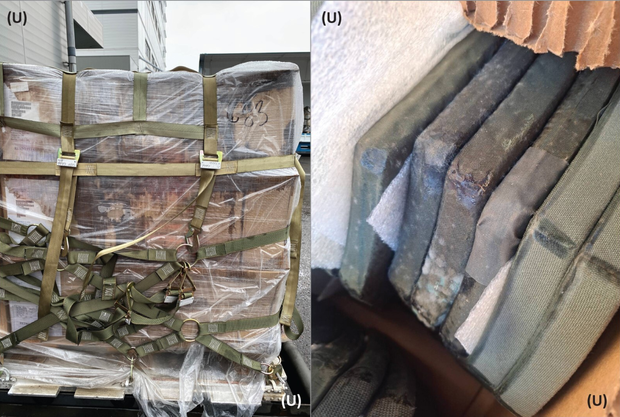U.S. delivered

The Pentagon sent Taiwan “wet and moldy body armor” in shipments of armaments meant to strengthen Taiwan’s defenses, but instead, the U.S. spent at least an additional $730,000 to try to remedy the problems, according to a report released this week by the Defense Department inspector general.
The independent watchdog concluded that between November 2023 and March 2024, the Pentagon failed to follow guidelines on delivering assistance through the presidential drawdown authority, which allows the U.S. to send allies equipment from current Defense Department stocks.
“Had policies been followed, the Defense Department would have been able to provide Taiwan with military equipment in acceptable condition,” Inspector General Robert Storch said in a statement. “Instead, the equipment arrived in Taiwan damaged and moldy. Such performance risks eroding Taiwan’s confidence in the United States as a reliable source of assistance.”
The American Institute in Taiwan via Defense Dept. inspector general’s report, September 2024
The damaged equipment was part of the $345 million package the Biden administration announced in July 2023, which was the first drawdown the U.S. has ever committed to Taiwan.
More than 340 out of 504 pallets of equipment — about 67% — sustained water damage as they sat for three months at Travis Air Force base waiting for a flight to Taiwan. Some of the pallets were exposed to blowing rain, fog, humidity and heat because the base did not have sufficient storage facilities, according to the report.
The inspector general’s office observed the pallets had “visible mold spores, wrapped in plastic that had trapped water, facilitating further deterioration and mold growth.”
Of the 340 water-damaged pallets, 120 were delivered to Taiwan, containing more than 3,000 mildewed body armor plates and 500 wet and moldy tactical vests. Taiwanese authorities spent weeks unpacking and drying the equipment, the report said.
The inspector general found there was miscommunication about whose responsibility it was to arrange the delivery flights to Taiwan and recommended the Pentagon agency in charge of providing training and equipment to U.S. allies — the Defense Security Cooperation Agency — develop a plan that clarifies the responsibilities and timelines for shipment and ensure there are processes to check the quality of shipments.
“Taiwan is a key security cooperation partner, and the U.S. Government is committed to ensuring that equipment delivered to this partner is sufficient for operational use,” Pentagon spokesperson Maj. Pete Nguyen said in a statement to CBS News, adding that future presidential drawdown authority — or PDA — packages for Taiwan “will be informed by the lessons learned from PDA-01, which was the first of its kind.”
U.S. personnel told the inspector general’s office they spent about $619,000 in labor and materials at the base to clean and dry wet and moldy body armor that had not been sent and then another $113,500 to replace some of the equipment before it was sent to Taiwan.
As of May 31, 2024, the U.S. had not sent Taiwan replacements for the damaged body armor plates and tactical vests that did arrive, according to the report.
The inspector general also found that some of the 2.7 million rounds of ammunition Taiwan received had expired and were sent “in a mix of original, loose, and incorrect packaging.”
The report says that the delivery of “unserviceable equipment” risks “degrading Taiwan’s confidence in the United States.”
Nguyen, a Pentagon spokesperson, said in the statement to CBS News, “We appreciate the perspective this report brings to a complex and unique issue for a critical security cooperation partner and anticipate the positive impact it will have on the Department moving forward.”
The defense budget for 2023 authorized the U.S. to spend up to $1 billion in presidential drawdown authority for Taiwan annually.










